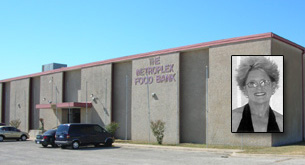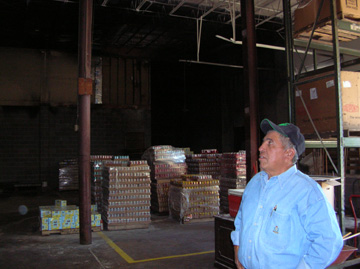 Sharon Hogan (inset) led The Metroplex Food Bank for many years, but she is now at the center of controversies that threaten the charity’s future.
Sharon Hogan (inset) led The Metroplex Food Bank for many years, but she is now at the center of controversies that threaten the charity’s future.
|
 Warehouse manager Braulio Martinez looks over fire damage late last year.
Warehouse manager Braulio Martinez looks over fire damage late last year.
|
|
A D V E R T I S E M E N T
|
|
|
|
A D V E R T I S E M E N T
|
|
Food Fight
The director of a local food charity is resisting attempts to remove her.
By JEFF PRINCE
The board of directors at the city’s oldest food bank has asked longtime Executive Director Sharon Hogan to resign amid myriad problems, including questionable spending, dismal health inspection reports, and an inability to get its salvaged food license reinstated. The board, expecting a fight from Hogan, even changed the door locks at the southeast Fort Worth warehouse where Metroplex Food Bank provides food to poor families and to other food pantries, board chairwoman Opal Lee said.
“The [state] attorney general’s office has suggested more than once that we get rid of her,” Lee said.
Hogan did not respond to phone messages left by Fort Worth Weekly, which examined the food bank’s decline and Hogan’s dubious leadership in a cover story (“Crumbs in the Cupboard,” Nov. 9, 2005). During the investigation for that story, Hogan was asked to provide a current Internal Revenue Service Form 990, a nonprofit group’s tax return. Law requires that tax-exempt organizations provide the form upon request. Hogan refused. “You’re asking for a 990 and that makes me suspicious and makes me know that your motives are not good; I don’t need the bad publicity right now,” Hogan told the Weekly on Nov. 3.
Since then, most of a recent $20,000 grant to the food bank has evaporated without explanation, Lee said, and she’s trying to get an accounting of where it went. The food bank has fallen behind on utility bills. Damage from a fire last summer has yet to be repaired to suit the Department of State Health Services. And Hogan has encouraged workers to defy an attorney general’s ruling that prevents the charity from storing food in its 35,000-square-foot warehouse, Lee said.
Office manager Tola Martinez said she has “mixed emotions” about the board’s action to remove Hogan. Martinez and her husband, Braulio, have volunteered and worked alongside Hogan for several years. Martinez said she was surprised when she received a copy of the board’s letter asking for Hogan’s resignation. “It bothers me a little bit, yeah,” she said. “She’s been my boss for quite some time. It hurts because she’s been running this place.”
Lee, too, has been friendly with Hogan for years. But the board voted unanimously to replace the director, and Lee already has a replacement in mind — “a young woman who is a fireball who we could get as an interim,” she said, although she wouldn’t yet identify the candidate.
She envisions the food bank blossoming under new leadership and evolving into something similar to Tillie Burgin’s Mission Arlington and the Rev. Leon Sullivan’s Philadelphia-based Opportunities Industrialization Centers of America, a network of employment and training centers serving the hardcore poor and unemployed.
“I hope we can turn the food bank around because I feel it’s a necessity, and the potential is too great to let it go down the tubes,” Lee said.
The mercurial Hogan isn’t inclined to go gently into the night. For years, she relied on an uninvolved and timid board of directors to stay out of her way while she ran things as she saw fit, drew more than $100,000 a year in salary and benefits, drove a Lexus, and spent much of the nonprofit’s money on administrative and fund-raising costs rather than on feeding the poor.
Bucking Hogan could be a chore. Many of the nonprofit’s files and records are stored at Hogan’s Arlington house rather than at the food bank. And when Lee told Hogan several weeks ago that the board was meeting to discuss new leadership, the embattled director dug in her heels. “She in turn said that she was going to hold a meeting on the 22nd of this month and she had recruited somebody to take my place,” Lee said.
Metroplex Food Bank has been around for 23 years, longer than the region’s two other facilities — Tarrant Area Food Bank in Fort Worth and North Texas Food Bank in Dallas. And while food salvage insiders have long gossiped about Hogan’s secretive methods and spending practices, none has challenged her in public.
Signs of erratic leadership began surfacing in 2002, when a small fire caused $15,000 in damages to the building, including a hole in the roof. Repairs were slow, and health inspectors would later note pallets stacked underneath the hole, causing food to get wet during rains. Later that year, a routine health inspection uncovered moldy and thawing food in a freezer that was 13 degrees above freezing. About 100,000 pounds of meat, eggs, produce, juice, and frozen foods were marked for destruction. Food bank workers were unable to provide current maintenance reports or temperature logs, the inspectors reported.
Hogan used the incidents as fund-raising opportunities. Private contractors repaired the roof and the freezer for free, and numerous donations were received, including $25,000 in cash from a national corporation.
In 2003, Hogan did not respond to an annual questionnaire sent to local nonprofits by the Fort Worth Better Business Bureau, which promotes ethics in the marketplace through self-regulation and education. The bureau had reported that the food pantry didn’t meet bureau standards for charitable organizations, pointing out that it spent too little on programs and allowed a paid employee (Hogan) to also serve as board chairperson. Opal Lee, a longtime board member and activist in the African-American community, was later named chairwoman.
Problems continued at the food bank when an early-morning fire erupted on July 11, 2005, and ruined an estimated $100,000 worth of food in the warehouse. Once again Hogan lamented to the news media and sought public support. Few people were aware that a health inspector the previous week had found numerous violations, including insects in food and rodent feces. The inspector marked the warehouse’s entire contents for destruction and was scheduled to return on July 11 — the day of the fire — to make sure the food had been discarded. The Fort Worth Fire Department ruled the fire an accident, blaming an overloaded electrical outlet in a banquet room next to the warehouse.
Hogan’s wrangling with health inspectors resulted in the case being referred to the Office of the Attorney General for enforcement late last year. Since then, the state has threatened to take over the nonprofit and put it into receivership.
GuideStar, a national group that oversees nonprofits, provided the Weekly with an analysis of Metroplex Food Bank finances showing that only about 40 percent of the nonprofit’s money was spent on mission-related programs. The median percentage among 412 similar groups nationwide was 93 percent, prompting GuideStar spokeswoman Suzanne Coffman to say, “Thirty-nine percent would concern me if I was a member of the board.”
Lee defended Hogan during a November interview with the Weekly, saying the executive director and CEO had proven herself a worthy leader for two decades and deserved a chance to rebound from the controversies. In the months since then, that support wilted under increasing pressure from the attorney general.
“I think this will stop them [the attorney general’s office] from filing a suit against us,” Lee said. “They are really receptive to working with us.”
 Email this Article...
Email this Article...

